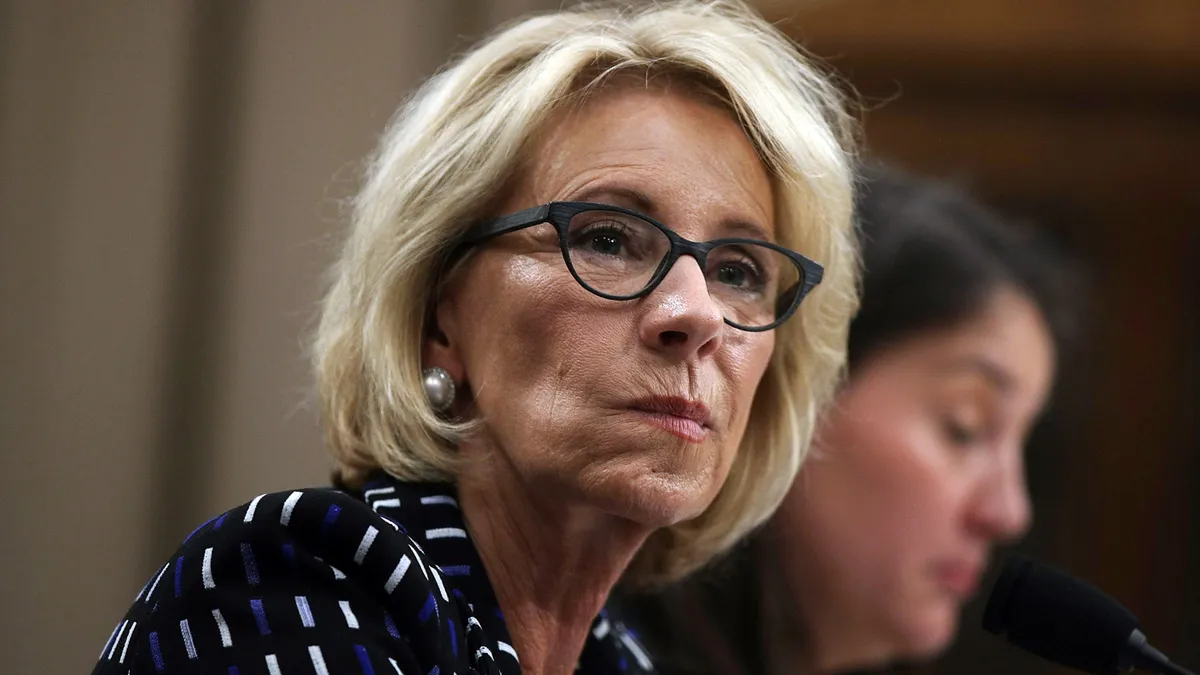A few weeks after the Trump administration unveiled its proposed fiscal year 2020 budget, Capitol Hill lawmakers from both chambers of Congress gathered to grill U.S. Education Secretary Betsy DeVos on the requested funding for her department and the programs outlined — or eliminated — in the plan.
President Donald Trump's budget proposal moves to cut federal education funding by 10% and eliminate 29 programs. Among its major initiatives are a boost to school choice, promoting safe and secure schools, and encouraging more teacher control over professional development.
Between a House hearing on Tuesday and a Senate hearing on Thursday, DeVos faced questions from lawmakers on several topics. However, debate over three key parts of the proposed budget garnered the most attention.
Gutting funding for the Special Olympics
The Trump budget proposal initially included the elimination of nearly $18 million in funding for the Special Olympics. During the House budget hearing, DeVos — who has proposed, and failed, to eliminate the funding twice before — said devising the budget came with a lot of "difficult decisions" and that "given our current budget realities, the federal government cannot fund every worthy program, particularly ones that enjoy robust support from private donations."
DeVos' defense quickly went viral on social media and garnered widespread bipartisan criticism among lawmakers, educators and members of the public, all of whom spoke out against the idea.
DeVos announced in December 2018 that she would donate part of her salary to the Special Olympics and said she "love[s] its work and ha[ve] personally supported its mission." This came after she said she misunderstood questions about the Individuals with Disabilities Education Act (IDEA) from lawmakers during her January 2017 confirmation hearing. The then-nominee said enforcement of the federal law should be delegated to states but later clarified that, if confirmed, she would be “very sensitive” to the needs of students with disabilities.
During the House hearing, she also alluded to the budget's support for students with disabilities through other avenues — most notably, $13.2 billion for IDEA funding and a $225.6 million grant to support research, technical assistance, and teacher preparation and development in serving those with special needs.
Hours after DeVos' latest round of questioning, Trump announced Thursday that he had "just authorized the funding of the Special Olympics" and had "overridden" the secretary's plan.
Education Freedom Scholarships
Another main source of discussion is what the U.S. Department of Education's budget lists as its "most transformative educational proposal," Education Freedom Scholarships (EFS). EFS is a voluntary program that taxpayers could contribute to — in exchange for federal tax credits, capped at $5 billion annually — and states would pick their own scholarship parameters.
In addition, the budget proposes $500 million in federal aid to charter schools — a $60 million increase. Critics say the move would draw funding away from public schools, which enroll roughly 90% of the students attending elementary and secondary schools. The House education subcommittee chairwoman, Rep. Rosa DeLauro, D-Connecticut, said the program was "unregulated, unaccountable, and an effort to fund private school voucher programs."
DeVos addressed this point in her testimony before the Senate education subcommittee hearing on Thursday, saying "the proposal is not just for students who wish to attend private schools. States can decide to use scholarships to expand public school options — such as [career and technical education], apprenticeships, dual enrollment programs or transportation to out-of-zone schools."
As part of their questioning, House Democrats also cited a report from the Network for Public Education advocacy group that said the federal government has wasted $1 billion on charters that never opened. But DeVos stressed that this is part of the experimentation process.
School safety and discipline
The budget request also calls for the allocation of $200 million in grants that states and school districts can use for school safety activities, including both physical security — such as emergency operation plans — and mental and emotional well-being through initiatives including counseling resources. But amid calls for significant boosts in mental health supports for schools, the proposal also moves to eliminate $1.2 billion worth of Title IV grants — another way schools can help students outside the classroom.
Within the past week, two students and Parkland survivors, as well as the father of a Sandy Hook Elementary shooting victim, died in apparent suicides. During the Senate budget hearing, Sen. Chris Murphy, D-Connecticut, said without this federal funding, initiatives preventing suicides "are not just going to be automatically replaced by private dollars."
In December, the Federal Commission on School Safety — which DeVos chaired and which formed in the aftermath of the Parkland, Florida, school shooting — released its final recommendations. Among them: arming school personnel, expanding mental health resources, and rescinding Obama-era guidance aimed at eliminating racial disparities in school discipline.
Rep. Katherine Clark, D-Massachusetts, wondered why the group came to that decision. She asked DeVos, "When you talk about children shall be treated individually, what are you saying? Are you saying ... that the problem really is that black children are just more of a discipline problem? Because that's the research you have quoted in your report."
DeVos' response: "No student, no child should be treated or disciplined differently based on their skin color, race or their national origin."




















